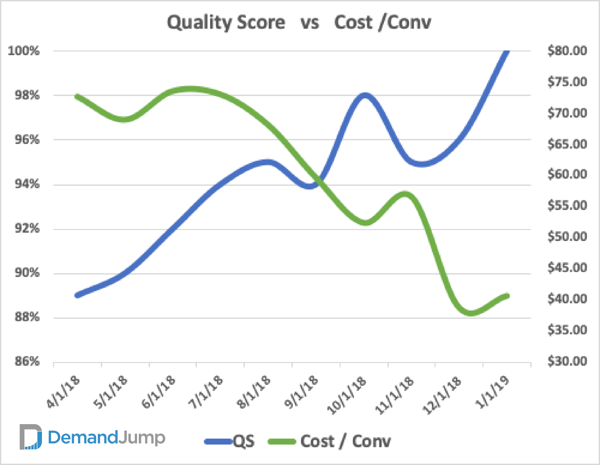What is ad relevance?
Relatively self-descriptive, ad relevance refers to how closely your ad’s content relates to the keywords you bid on. Ad relevance is one of the three components of quality score, and is used to understand the overall quality of your ads.
As discussed in this resource, improving ad relevance and overall quality score is shown to decrease your cost per click and cost per conversion in Google Ads.
Why improve it?
Improving ad relevance helps improve your overall quality score. Using the data we've gathered across our customer's accounts, we've observed close to an inverse relationship between quality score and CPCs. Meaning, as you increase your quality score, you pay less for your ads in Google Ads.

Improving ad relevance alone can decrease your ad costs as well. Cole Geitner details in the video above that by focusing on ad relevance, he and DemandJump's customer success team were able to decrease a client's costs per acquisition by 50%.
How to improve ad relevance
Improving ad relevance comes down to how holistically aligned your ads are to the keywords you bid on. So the more completely your ads complement the keywords you bid on, the better. As also addressed in the video above, here are a few tips to improve ad relevance.
Run multiple ads with hyper-focused content
Ad relevance is one of the easiest components of quality score to test and improve in a short timespan. Running multiple ads allows you to test ad copy relentlessly and benchmark performance against other ads to uncover what works (and what doesn't).
Creating hyper-focused ads, with limited keywords per ad group, is an important aspect of this tip.
Don't complicate your ad groups
Many marketers will complicate their ad groups with a variety of different keywords, but this makes your ads less effective for a number of reasons.
- It confuses Google, allowing your ads show up for less focused search queries. This will cause you to rank lower due to your inclusion of other, less related, keywords to the query being searched. When you limit your keywords within an ad to more specific searches, they are better tailored to the searches being made, and your ads will perform better without the added noise.
- It makes reporting more difficult. When you separate out your keywords into different, more focused ad groups and ads, you can better understand what is working, and what's not. With this un-muddied ad testing, you'll be able to iterate and optimize more quickly.
Use ad extensions
Ad extensions are a great way to improve the relevance of your ads. Here, you're able to add additional callouts, phone numbers, and contact information to give consumers another chance to click on your ads.
This additional information not only makes your ads more appealing to potential customers, it also signals to Google that your ads are high quality and gives Google another reason to rank your ads higher than your competitors'.